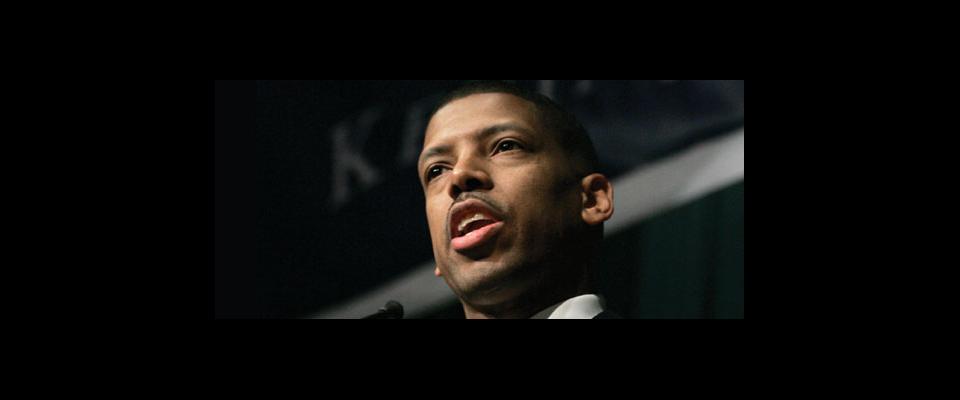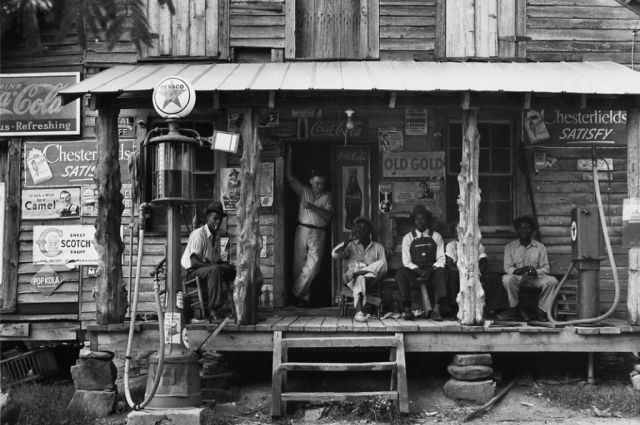Kevin Johnson in the Mayor’s Office.
Kevin Johnson, the new mayor of Sacramento and former Cal basketball star, says that when he first introduced himself to Barack Obama in 2007, the presidential hopeful shook his hand and smiled. “I know who you are,” Obama said. “I rooted against you in Chicago.”
It shouldn’t come as any great surprise that the Senator from Illinois would have recognized Johnson ’87. The defining moment in his professional basketball career came in Game 3 of the 1993 NBA finals, against Obama’s beloved Bulls. Johnson played an NBA record 62 minutes for the Phoenix Suns in that epic game. While guarding the Bulls’ superstar Michael Jordan, the startlingly quick Johnson poured in 25 points en route to a 129–121 triple-overtime victory.
The Suns ultimately lost the series, but Johnson had proven himself, shrugging off critics after a poor opening performance, to put in a gutsy winning effort against the game’s best player on basketball’s greatest stage. The man fans called “KJ” had arrived on the national scene. His grit and perseverance cemented his image—the gifted athlete capable of sensational physical feats, who also possessed formidable mental and emotional toughness.
Johnson’s arrival on the political scene came 15 years later. On November 4, 2008, the same night Barack Obama was elected the first African American president, KJ became Sacramento’s first African American mayor. Like Obama, Kevin Johnson was primarily raised by his Caucasian maternal grandparents. (Johnson’s mother was only 16 when he was born, and his father accidentally drowned in the Sacramento River when Johnson was 3.) The coincidental elections and striking similarities between the two men led some in the media to call Johnson a “mini-Obama.” For his part, the newly elected mayor told the Sacramento Bee: “Obama and myself, we ran on the promise and the theme of change. No more business as usual.”
The similarities only go so far, however. Johnson is much more socially conservative than his counterpart in the White House. An outspokenly Christian candidate, he ran on a pro-business platform that alienated some Democrats in the liberal-leaning capital city. The campaign was hard fought, with Johnson raising $1.8 million to his opponent Heather Fargo’s not-quite $635,000. As a political novice, Johnson took heat for his lack of experience. He also had to contend with controversies involving both his personal life and his business dealings.
During the 2008 election, Johnson was accused of inappropriately touching a female student at Sacramento High School. The girl recanted the story after speaking with Johnson’s personal attorney, but a similar incident from his days in Phoenix was subsequently uncovered by the Sacramento Bee. In that case, a financial settlement was reached. Johnson doesn’t comment specifically on these incidents except to deny any wrongdoing.
The other major controversy that dogged Johnson’s campaign centered on St. Hope, the nonprofit organization he founded in 1989 in the same Oak Park neighborhood where he grew up. The stated mission of St. Hope is to “revitalize inner-city communities through public education, civic leadership, economic development and the arts.” During the nearly two decades in which Johnson oversaw the organization as CEO, the enterprise grew to include an independent charter school system and a mixed-use development in Oak Park called the 40 Acres Art Gallery and Cultural Center. The St. Hope website touts these accomplishments and claims that its efforts have resulted in nearly 300 jobs and the infusion of “more than $10 million in economic and real estate development investments” into the local community.
But throughout 2008, St. Hope was investigated by the U.S. Attorney’s office for alleged misuse of public funds, and in April of 2009 a settlement was reached requiring repayment of some $400,000 to AmeriCorps. Without the settlement, Sacramento would have been denied millions of dollars in potential stimulus money because its mayor would have been decertified by the federal government and ineligible to oversee federal funds for the city. Johnson’s hand-picked executive director of St. Hope and two formerly close friends and board members resigned once the investigation was concluded.
Even that didn’t end the matter: After Gerald Walpin, inspector general for the Corporation for National and Community Service, objected to the settlement and suggested that serious charges were in order, he was abruptly fired from his position by President Obama, who informed Congress that he had “lost confidence” in Walpin’s judgment. Many people wondered if the mayor’s personal relationship with the president played a part in that decision. The matter was finally resolved in November, when an FBI probe into obstruction of justice allegations against St. Hope was closed without charges.
If any of this seriously bothers Johnson, he doesn’t show it. His political temperament is as cool and focused as his style on the basketball court. Indeed, it seems that politics have replaced basketball as his competitive outlet. “The adrenaline rush you get from sports—people get in business and people get in politics,” Johnson says, sitting in his bright fifth-floor downtown office. “There’s that transactional moment in sports, business, and politics—plus there’s a clear winner and loser.”
If his political career comes anywhere close to his basketball trajectory, Johnson will have influence far beyond California’s capital. A two-time all-conference guard at Cal, Johnson became the school’s all-time leading scorer during his four seasons as a Golden Bear (1984–87), with 1,655 points. In the NBA, Johnson was a three-time All Star, and for three consecutive seasons he averaged at least 20 points and 10 assists per game, a feat matched only by Hall-of-Famers Oscar Robertson and Isaiah Thomas. Both Cal and Phoenix retired his jersey number.
His transition to the pros wasn’t seamless, however. The Cleveland Cavaliers picked him in the first round of the 1987 NBA draft, but traded him to Phoenix before his first season ended. The rookie took the move in stride. “I knew the NBA was a business and was prepared for anything that might happen,” Johnson says.
Acquiring Johnson transformed the Phoenix franchise, which had been in a three-year slump until Johnson’s arrival. In his first full season with the Suns, the team won 55 games after winning only 28 the year before. He won the league’s Most Improved Player Award while leading the Suns to the Western Conference Finals. And in his ten full seasons at Phoenix, the Suns made the playoffs every year. “People kind of know he was real good,” says Paul Westphal, who coached Johnson for eight years in Phoenix and is now the head coach of the Sacramento Kings, “but I don’t think they know how good.”
From the beginning, basketball was just a stepping-stone for Johnson. “I remember my grandfather telling me before I got drafted, you need to have an exit strategy,” Johnson says. “So before I even got into the NBA I was thinking about what I wanted to do afterward, and that dictated what I did going in.”
A political science major at Cal, he earned better-than-average grades and was admitted to the Master of Theological Studies program at Harvard Divinity School in 2000. He deferred enrollment to stay in Sacramento, concentrating on his business interests and St. Hope Academy, which began as an after-school program and now comprises seven distinct schools.
Education has always been his highest priority. “It transcends everything else for him,” Steve Malviglio says. Malviglio, a political veteran who ran Johnson’s election campaign after the primary and still advises him on a volunteer basis, says Johnson’s commitment makes him stand apart. “Kevin could have walked away from an NBA career, bought a big house in Granite Bay, and called it a day. But he’s spent a lot of time and energy investing back in the city and investing in kids,” Malviglio says.
“He wants to give something back to the community that promoted him and gave him the opportunities he’s had. He really believes in that,” echoes Dr. Barbara O’Connor, director of the Institute for the Study of Politics and Media at California State University, Sacramento.
Another of Johnson’s early actions as mayor was creating an initiative called For Art’s Sake, which coordinates local arts organizations to promote arts education and funding. Johnson personally attends the monthly general meetings. “He’s information hungry,” Malviglio says. “He loves statistics; he loves talking to experts.” The effort has already reaped benefits. Sacramento City Unified and Twin Rivers Unified were the first school districts in the nation to be included in the Kennedy Center’s Any Given Child program for students in kindergarten through eighth grade.
The mayor has also taken an aggressive approach to dealing with Sacramento’s homeless population. He visited homeless enclaves along the American River to get a sense of the spare living conditions. “In the city of Sacramento, I feel like we were sweeping it under the rug,” Johnson wrote in a press release after his experience. In September, he created a task force to come up with solutions, and in October announced Sacramento will receive up to $9 million in stimulus funding to find permanent housing for the homeless and host prevention programs. He also shepherded a new program to open 269 temporary beds and motel rooms to Sacramento homeless during the winter.
Not surprisingly, Johnson has also made his hometown NBA franchise one of his top priorities, pushing for a new downtown arena to keep the team from leaving the city. Once a perennial playoff contender, the Kings are now among the league’s worst. Johnson has made personal pitches to area businesses for community support of the team by filling seats.
As with Governor Arnold Schwarzenegger, the bodybuilder–turned–movie star–turned–politician, Johnson heightens Sacramento’s profile just by dint of his celebrity. “He is complicated, but I think he’s brought a lot of interest to things that have languished in Sacramento,” political analyst O’Connor says.
In person, Johnson’s presence and charm easily match Schwarzenegger’s renowned charisma. At an early-evening October town hall meeting in Sacramento, Johnson gravitates toward older people who adore him and younger ones who appreciate his focused attention. Despite having been up early to deal with a leak of confidential city documents to the media, Johnson is upbeat and energetic. He jokes about a recent incident in San Francisco, when his garment bag was stolen while he helped an elderly man into a cab.
If it seems like he’s still running for office, it may have something to do with the so-called Strong Mayor initiative, which will be placed on a special election ballot in June. If passed, the initiative will give Johnson power equaling that of chief executives in the largest cities in California, plus many responsibilities now held by the city manager. Essentially it’s a referendum on Johnson as mayor so far, just one year into his term. Given the controversies he has weathered, the vote could go either way, but he is game. He goes at politics like he competed on the court, blowing past defenders on his way to the basket. If KJ gets knocked down, he comes back doubly determined.
“I knew the political arena could be a battlefield,” Johnson says, “and it has not disappointed.”


















